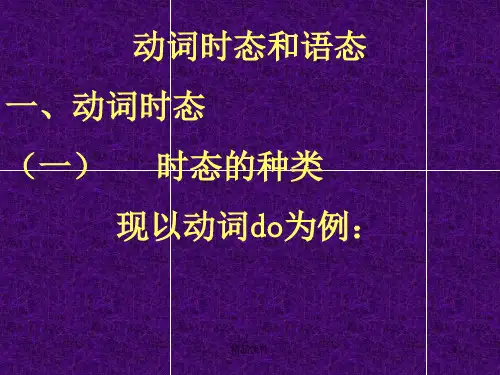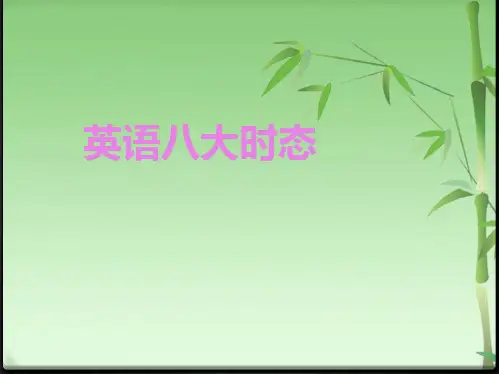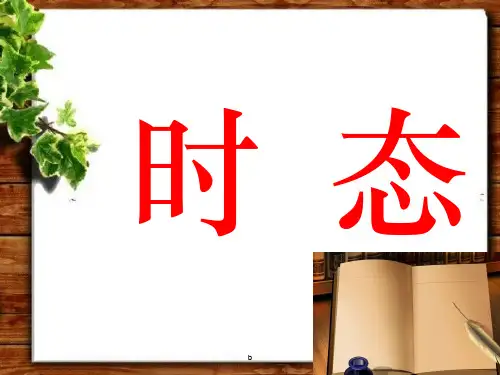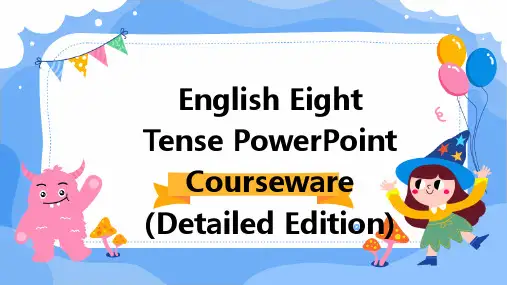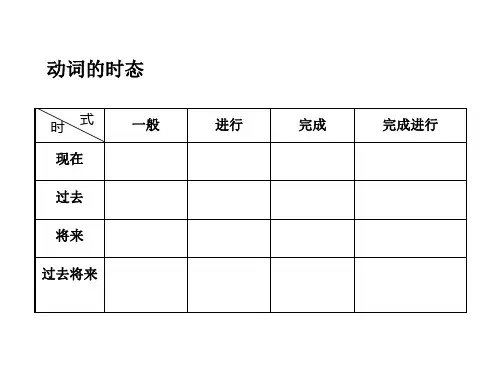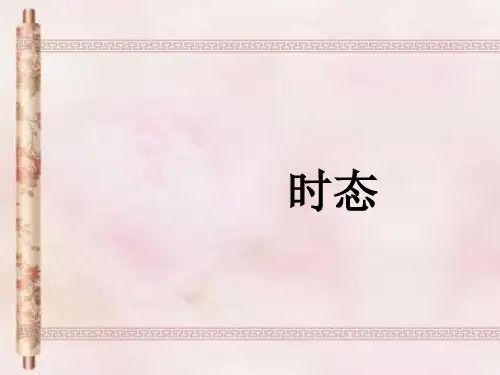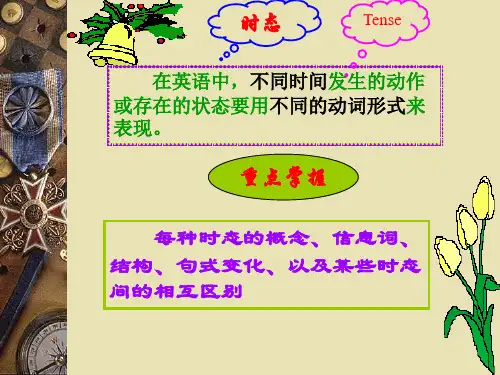- 1、下载文档前请自行甄别文档内容的完整性,平台不提供额外的编辑、内容补充、找答案等附加服务。
- 2、"仅部分预览"的文档,不可在线预览部分如存在完整性等问题,可反馈申请退款(可完整预览的文档不适用该条件!)。
- 3、如文档侵犯您的权益,请联系客服反馈,我们会尽快为您处理(人工客服工作时间:9:00-18:30)。
过去将来完成时 过去将来完成进行时 should should have studied have been studying would would
现在
过去
时 态
将来 高考题 巩固 题1
巩固 题2
主动
语 态
被动
一般现在时 现 在 现在进行时 现在完成时
一般现在时
goes around the sun when I I learned that the earth ___ was in primary school. 考点一:表示永恒的真理,即使出现在过去的语境中,仍 用一般现在时。 If he accepts the job, he will get more money soon. 考点二:在时间和条件状语从句中,代替一般将来时;常 用的引导词有: 时间:when, until, after, before, as soon as, once, the moment/the minute; Eg: When Bill comes (不是will come), ask him to wait for me. 条件:if, unless, provided.
since的四种用法 1) since +过去一个时间点 (如具体的年、月、日期、钟 点、1980, last month, half past six)。 I have been here since 1989. 2) since +一段时间+ ago
I have been here since five months ago.
现在完成时
考点一:for + 时间段;since + 时间点 They have lived in Beijing for five years. They have lived in Beijing since 1995.
考点二:常见的不确定的时间状语:lately; recently, just, already, yet, ever, never, up to now; till now; so far, these days, once, twice, three times… Has it stopped raining yet ? 考点三:在表示“最近几世纪/ 年/ 月以来……”时间状语 中,谓语动词用现在完成时。 in/ over / during the past few years/months/weeks/days; for the last few centuries, through centuries; throughout history 等
考点二: 表示在最近按计划或安排要进行的动作 ,仅限 于少量动词:go, come ,leave , start , arrive , return , stay , do, have, see sb off …
Are you staying here till next week? How are you getting on with your 工作进行的怎么样? work? 工作进行的相当顺利。 The work is going fairly smoothly. 你进步很快。 You‟re making rapid progress. 我们想在这里建一座 We‟re thinking of building a dam 水坝。 here. 风挺大 It‟s blowing hard. 有人找你接电话。 Someone is asking for you on the phone.
现在进行时
being built The house is _____________these days.
The little boy is always making trouble.
考点一:与频率副词,如always,constantly, continually等连用表示说话人的某种感情色彩(赞叹、 厌烦、埋怨等)。 He is always thinking of his work (赞许) 他老是把东西乱扔。 He is constantly leaving his things about.(不满) 他老爱说大话。 He is always boasting (厌烦)
Tense & voice
时态的种类
英语动词有16种时态,现以study为例,列表如下:
体(form) 时(time)
一般时 indefinite
一般现在时 study studies
进行时 continuous
现在进行时 am is are was studying
完成时 perfect
现在完成时 have studied has
完成进行时 perfect contห้องสมุดไป่ตู้nuous
现在完成进行时 have been has studying
现在 present
过去 past 将来 Future
过去将来 Future in the past
一般过去时
studied
过去进行时
studying were
过去完成时
had studied
Tom has written a letter to his parents last night. (错)
Tom wrote a letter to his parents last night.
答案A. 等待的动作由过去开始,持续到现在,应用现 在完成时。
一般过去时 过 去 过去进行时 过去完成时
一般过去时的考点分析(考核重点)。 ①表示过去的事情、动作或状态常与表示过去具体的时间 状语连用(或有上下文语境暗示);用于表达过去的习惯; 表示说话人原来没有料到、想到或希望的事 I met her in the street yesterday. He used to smoke a lot. I thought the film would be interesting, but it isn’t. read He told me he ________an interesting novel last night . ②如果从句中有一个过去的时间状语,尽管从句中的动作 先于主句发生,但从句中的谓语动词用过去式。
过去完成进行时
had been studying
一般将来时 shall study will
过去将来时 should study would
将来进行时 shall be studying will
过去将来进行时 should be studying would
将来完成时 将来完成进行时 shall shall have studied have been studying will will
典型例题 1. You don„t need to describe her. I ___ her several times. A. had met B. have met C. met D. meet 答案B. 首先本题后句强调对现在的影响,我知道她的 模样,你不用描述。再次,several times告知为反复发 生的动作,因此用现在完成时。 2.---I„m sorry to keep you waiting. ---Oh, not at all. I ___ here only a few minutes. A. have been B. had been C. was D. will be
3) since +从句 Great changes have taken place since you left. 4) It is +一段时间+ since从句 It is two years since I became a postgraduate student.
他去过北京。
He has been to Beijing.
If you will accept my invitation, my family will be pleased. 注意:由if 引导的条件状语从句中可以用shall或will表 “意愿”,但不表示时态。 1)The train ______at leaves six tomorrow morning. starts When does the bus start? It ______in ten minutes. 考点三:下列动词:come, go, arrive, leave, start, begin, return,open , close的一般现在时表将来。这主要用来表 示在时间上已确定或安排好的事情。 2)倒装句(由here,there开头的句子,动词用一般 现在时表示现在正在发生的动作) Here comes the bus. = The bus is coming. There goes the bell. = The bell is ringing.
C. ever, come
D D. ever, have come
注意:非延续性动词的否定形式可以与表示延续时间的 状语连用。即动作不发生的状态是可以持续的。 (错)I have received his letter for a month. (对)I haven't received his letter for almost a month
注意:下面四类动词不宜用现在进行时。
(A)表示心理状态、情感的动作:like, love, hate, care, remember, believe, want, mind, wish, agree, mean, need。 (B)表存在的状态的动词:appear, exist, lie, remain, seem, belong to,depend on。 (C)表示一时性动作的动词:allow, accept, permit, promise, admit, complete。 (D)表示感官的动词:see, hear, notice, feel, smell, sound, taste, look。


